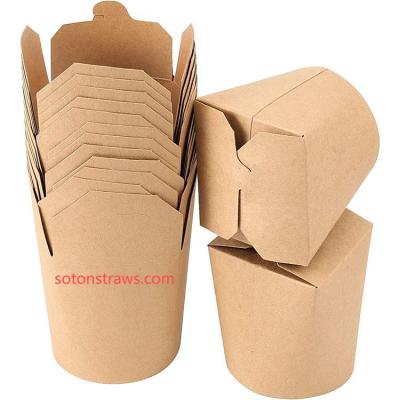Soton: Where Advanced Science Meets Disposable Kraft Box Needs
-
The appeal of the disposable kraft box is undeniable. Its natural aesthetic conveys earth-friendliness, and kraft paper's biodegradability seems like an environmental win. Yet, the functional demands of packaging – containing grease, preventing sogginess, maintaining structure – have traditionally required compromises that undermine these green credentials. The quest for a genuinely sustainable box hinges on pioneering material science that delivers robust performance without synthetic additives, pushing the boundaries of what plant-based resources can achieve.
This pursuit moves beyond simply avoiding plastic linings. It involves re-engineering the kraft paper itself and developing sophisticated, entirely bio-based coatings. Researchers focus on enhancing the natural resistance of cellulose fibers through specialized pulping techniques or incorporating naturally hydrophobic substances like lignin derivatives during the papermaking stage. Simultaneously, intensive work goes into formulating coatings from renewable sources: chitosan derived from shellfish waste, waxes from plants like candelilla or carnauba, proteins, or specially processed starches. These coatings must form effective, uniform barriers, adhere securely to the kraft substrate, and crucially, decompose in harmony with the paper in composting environments.
Performance testing is rigorous and multifaceted. A viable disposable kraft box solution must withstand real-world conditions: hot, oily foods; acidic dressings; condensation from cold items; and the physical stresses of stacking, transport, and consumer handling. Accelerated aging tests simulate longer storage periods. Crucially, decomposition testing under industrial composting conditions is non-negotiable, verifying that all materials break down within defined timeframes into non-toxic biomass, leaving no harmful residues or microplastics. Achieving this trifecta – functionality, consumer safety, and complete environmental compatibility – is the holy grail of sustainable packaging science.
Manufacturers leading this charge integrate deep technical expertise with scalable production capabilities. They operate specialized coating application lines capable of precision layering these novel bio-barriers onto kraft paper rolls. Temperature control, drying times, and curing processes are meticulously managed to ensure coating integrity and performance. Quality control is embedded at every stage, from raw material inspection to final box formation. They build partnerships with suppliers committed to sustainable forestry for the kraft paper and ethical sourcing for bio-coating ingredients, ensuring the entire supply chain aligns with the end product's ecological mission.
Soton stands at the forefront of this material revolution. We are not just producers; we are innovators dedicated to redefining the disposable kraft box. Leveraging cutting-edge research and advanced manufacturing, we create boxes where high performance and true sustainability are inseparable. Our plant-powered barrier technologies ensure your food arrives perfectly contained, while guaranteeing the packaging returns seamlessly to the earth. Choose Soton to align your brand with the future of packaging – where material science serves both function and the planet, delivering uncompromised solutions you and your customers can truly believe in.click https://www.sotonstraws.com/product/biodegradable-straws/st101-paper-straws/ to reading more information.
